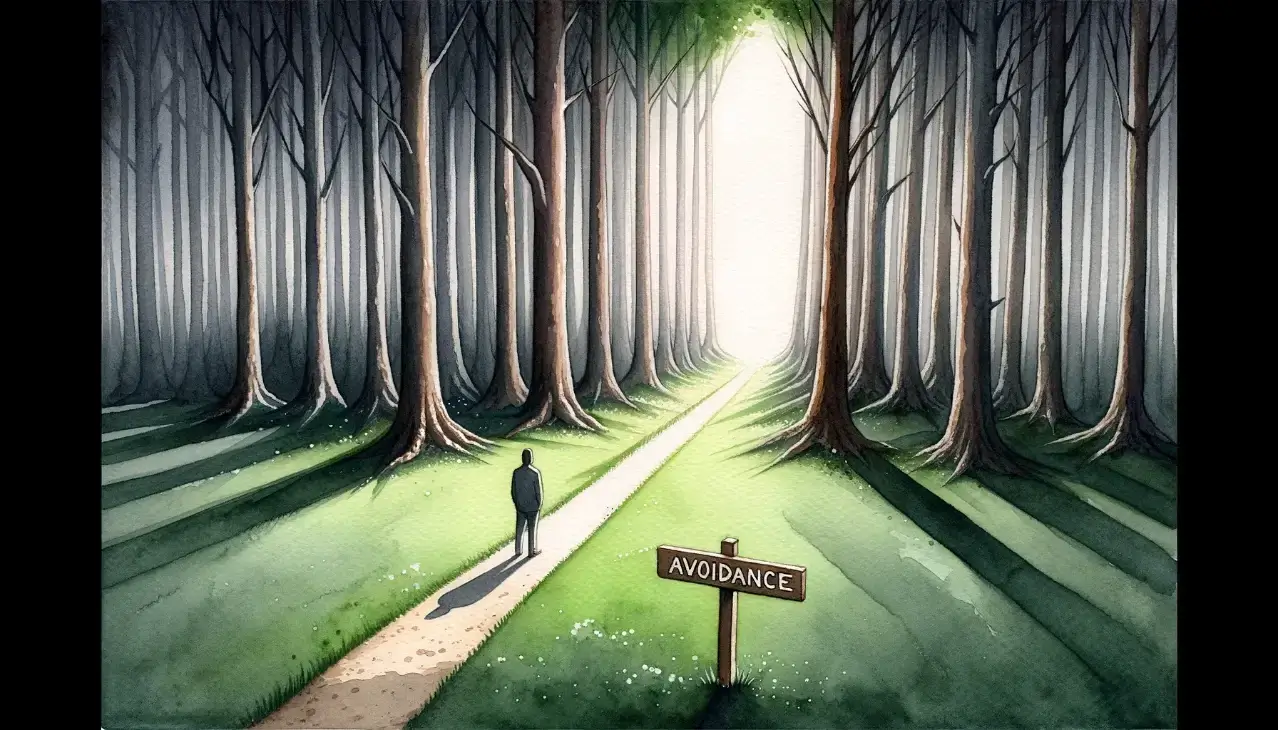We avoid people, places, and events in our life because of how we feel. I have avoided colleagues because I thought they didn’t like the way I handled a situation. I have avoided returning to restaurants because I thought the service was slow and the food was mediocre. I have avoided Christmas parties because I thought the past attendees drank too much. These thoughts about each of these left me feeling uncomfortable and led to my avoidance. Avoidance is just a way of saying that we are avoiding something because we feel uncomfortable. It’s an excuse we make when things get tough and we want to run away from the situation. I have avoided many things in my life and it has cost me.
Avoidance is our brain’s way to keep us safe. It is a subconscious action we are taking in response to our thoughts and feelings. Sometimes we are avoiding because our brain remembers a past situation that created bad feelings. Our brain is protecting us from experiencing these feelings again. Sometimes we are avoiding because we are contemplating experiencing something new and our brain is again protecting us by maintaining the status quo.
Avoidance, though, only works for a short time. We can avoid our feelings and thoughts for a little while, but eventually they will come back to us, often when we are least expecting it. The more we practice avoidance, the longer we have to wait before feeling safe again. We are all human and we all have the right to feel safe. However, if you want to grow as a person and reach your goals, then you need to take risks. You will never know what is on the other side of that cliff until you climb over it. When we avoid, we are not being true to ourselves. We are not doing what we want to do or living the life that would make us happy. We are also not learning and growing from our experiences. Sometimes, we are avoiding because we are afraid of failing. The truth is that you will not know until you try. If you never take the leap of faith and try something new, then nothing will change. An avoidance strategy may make us feel better in the short term, but it is doesn’t help us in the long term.
For me, as a parent of a child with a medical problem, I found myself wanting to avoid doctor’s appointments. I understand now that my subconscious inaction of procrastinating on scheduling appointments was the result of my thoughts. These thoughts ultimately led to my feelings which is what I was really trying to avoid.
Some parents dread doctor’s appointments because the parent will be required to advocate for their child. When parents don’t think they have the confidence to advocate, they become fearful and avoid the doctors. I am a doctor, though, so this reason for avoidance seemed silly because I shouldn’t be fearful of advocacy, but I was. Advocacy for your child involves agreeing, questioning, and perhaps disagreeing with a doctor or school official or caretaker. I held the belief that I am a people pleaser so thoughts of disagreeing with someone especially a colleague created waves of fear. This left me paralyzed.
Appointments are also the time when the reality of your child’s problem is at the forefront of your thoughts. Kyleigh lives every day with diabetes and I am reminded of it when the alarms on my phone alert me to her blood sugar are out of range. Even though these reminders are always present, they become subtle white noise. Doctor’s appointments, though, are the screaming reminder through the white noise that there is no cure for this condition. I would hear this reminder loud and clear during Kyleigh’s medical visits and I would feel hopeless. This, too, left me paralyzed.
The idea of sitting in a doctor’s office with my child made me feel uncomfortable and anxious. I didn’t know what to expect, and it scared me. So I avoided those appointments at all costs. In order to move past this place and into a place of action, I needed to first identify my thoughts. When I did this, it was clear that they were based on thoughts I had created. The truth is that we are all in charge of our thoughts and feelings. We can choose to believe something or not. The world around us has nothing to do with how we feel or what we think. So why do so many people fall victim to this type of thinking? I think it’s because they don’t understand the power they have over their own minds. I recognized that my feelings were created by my thoughts and I could change those thoughts. I learned that if I wanted to feel better, then I had to change the way I thought about things.
We know that appointments for our child cannot be indefinitely avoided. Of course, my child’s health depends on seeing her physicians and her health is important to me. I worked to understand the underlying cause of my avoidance and I practiced controlling my thoughts about advocacy and acceptance of our reality. I have learned to process emotions rather than escape them which has made me stronger, more courageous, and more fulfilled. I am now confident in my ability to take on uncomfortable situations like medical visits because I know I can choose how I think.
I am not helpless in the face of my child’s medical issues. I can take action to improve our quality of life, and that gives me hope for the future. I have learned that I can take action even when I am scared. I have gained confidence in my ability to cope with difficult situations and overcome obstacles because of this experience. My child’s health depends on seeing her physicians and her health is important to me. I have learned to be kind and compassionate towards myself. I can choose to think about something else or I can think about how important it is for us to get our child the care she needs. I am learning that self-awareness, mindfulness, and acceptance are powerful tools in helping me live as a parent with a chronically ill child. I know how to control my thoughts and I have learned that when we feel stress and anxiety it is because we are thinking about something in a way that makes us feel bad. When we change our perspective, the feelings go away.
If you find yourself avoiding something, it is important to ask yourself “why?”. Sometimes the answer will be obvious and other times it may take some digging. Once you have identified why you are avoiding a situation or experience, then decide if this avoidance is serving you. If not, then make a decision to move forward instead of allowing your brain to keep you stuck in the past.
What are you avoiding? Have you reflected on why you are avoiding it?





